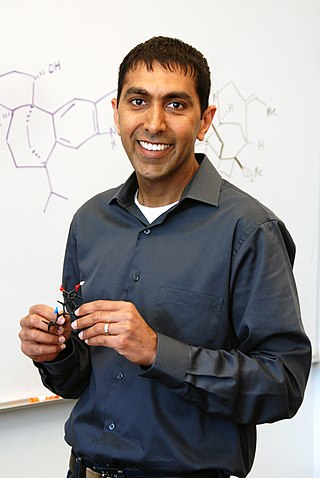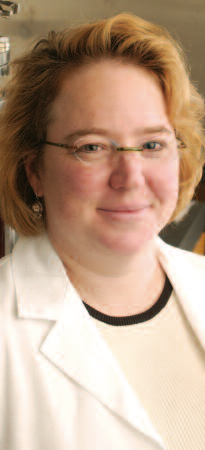Related Research Articles

Shirley Marie Tilghman, is a Canadian scholar in molecular biology and an academic administrator. She is now a professor of molecular biology and public policy and president emerita of Princeton University. In 2002, Discover magazine recognized her as one of the 50 most important women in science.

Paul Delos Boyer was an American biochemist, analytical chemist, and a professor of chemistry at University of California, Los Angeles (UCLA). He shared the 1997 Nobel Prize in Chemistry for research on the "enzymatic mechanism underlying the biosynthesis of adenosine triphosphate (ATP)" with John E. Walker, making Boyer the first Utah-born Nobel laureate; the remainder of the Prize in that year was awarded to Danish chemist Jens Christian Skou for his discovery of the Na+/K+-ATPase.
Christoph Carl Herbert "Chris" Adami is a professor of microbiology and molecular genetics, as well as professor of physics and astronomy, at Michigan State University. He is a core faculty member of the Ecology, Evolution, and Behavior (EEB) Program there.
Simon Asher Levin is an American ecologist and the James S. McDonnell Distinguished University Professor in Ecology and Evolutionary Biology and the director of the Center for BioComplexity at Princeton University. He specializes in using mathematical modeling and empirical studies in the understanding of macroscopic patterns of ecosystems and biological diversities.

David S. Eisenberg is an American biochemist and biophysicist best known for his contributions to structural biology and computational molecular biology. He has been a professor at the University of California, Los Angeles since the early 1970s and was director of the UCLA-DOE Institute for Genomics & Proteomics, as well as a member of the California NanoSystems Institute (CNSI) at UCLA.
The Gruber Prize in Genetics, established in 2001, is one of three international awards worth US$500,000 made by the Gruber Foundation, a non-profit organization based at Yale University in New Haven, Connecticut.
Emil L. Smith was an American biochemist who studied protein structure and function as well as biochemical evolution.
Utpal Banerjee is a distinguished professor of the department of molecular, cell and developmental biology at UCLA. He obtained his Bachelor of Science degree in chemistry from St. Stephen's College, Delhi University, India and obtained his Master of Science degree in physical chemistry from the Indian Institute of Technology, Kanpur, India. In 1984, he obtained a PhD in chemistry from the California Institute of Technology where he was also a postdoctoral Fellow in the laboratory of Seymour Benzer from 1984-1988.

Michael A. Marletta is an American biochemist. He was born in Rochester, New York, the son of Italian immigrants. He graduated from the State University of New York at Fredonia in 1973 with an A.B. degree in biology and chemistry, and from the University of California, San Francisco in 1978 with a Ph.D. degree in pharmaceutical chemistry, where he studied with George Kenyon. He was a postdoctoral fellow with Christopher T. Walsh at MIT from 1978-1980 and continued as a faculty member at MIT from 1980-1987 whereupon he joined the faculty of the University of Michigan, Ann Arbor. He was John G. Searle Professor of Medicinal Chemistry in the college of pharmacy and professor of biological chemistry at the University of Michigan. In 2001, he moved to the University of California, Berkeley to assume roles as Aldo DeBenedictis Distinguished Professor of Chemistry and professor of biochemistry and molecular biology, and served as the chair of the department of chemistry from 2005 until 2010. He was a Howard Hughes Medical Institute Investigator. From January 2012 to August 2014, Marletta was president and CEO of The Scripps Research Institute in La Jolla, California, succeeding Richard Lerner.
Joan Selverstone Valentine is a biological inorganic chemist and biochemist. Valentine's current work examines the role of transition metals, metalloenzymes, and oxidative stress in health. Her foremost expertise is superoxide anion and its functional enzyme superoxide dismutase. Valentine has been a member of the faculty of the University of California, Los Angeles since 1980. She served as Associate Editor of the journal Inorganic Chemistry from 1989 to 1995, and has served as Editor-in-Chief of Accounts of Chemical Research since 1994. In 2005, she was elected to the National Academy of Sciences.
Daniel H. Geschwind is an American physician-scientist whose laboratory has made pioneering discoveries in the biology of brain disorders and the genetic and genomic analyses of the nervous system. His laboratory showed that gene co-expression has a reproducible network structure that can be used to understand neurobiological mechanisms in health, evolution, and disease. He led the first studies to define the molecular pathology of autism spectrum disorder (ASD) and several other psychiatric disorders, and has made major contributions to defining the genetic basis of autism.

Neil K. Garg is currently a Distinguished professor of chemistry and holds the Kenneth N. Trueblood Endowed Chair at the University of California, Los Angeles.
Kevan Michael Shokat is an American chemical biologist. He is a Professor and chair in the Department of Cellular and Molecular Pharmacology at University of California, San Francisco, a professor in the Department of Chemistry at University of California, Berkeley, and an Investigator with the Howard Hughes Medical Institute.

Stephen R. Palumbi is the Jane and Marshall Steel Jr. Professor in Marine Sciences at Stanford University at Hopkins Marine Station. He also holds a Senior Fellowship at the Stanford Woods Institute for the Environment.
Catherine (Cathy) Drennan is an American biochemist and crystallographer. She is the John and Dorothy Wilson Professor of Biochemistry professor at the Massachusetts Institute of Technology and a professor at the Howard Hughes Medical Institute.

Shane C. Campbell-Staton is an American evolutionary biologist. Since July 2021, he has been an assistant professor in the ecology and evolutionary biology department at Princeton, where he leads a research group. His work is on how phenotypes respond to human activity that affects the environment. He also hosts the podcast 'Biology of Superheroes' together with Arien Darby.
Kim Orth is a microbiologist and biochemist. She is the Earl A. Forsythe chair in biomedical science and professor of molecular biology and biochemistry at UT Southwestern. She is a Howard Hughes Medical Institute investigator and a member of the National Academy of Sciences. Her research focuses on bacterial pathogenesis.

Nancy M. Bonini is an American neuroscientist and geneticist, best known for pioneering the use of Drosophila as a model organism to study neurodegeneration of the human brain. Using the Drosophila model approach, Bonini's laboratory has identified genes and pathways that are important in the development and progression of neurodegenerative diseases such as Amyotrophic lateral sclerosis, Alzheimer's disease, and Parkinson's disease, as well as aging, neural injury and regeneration, and response to environmental toxins.

Hilary Joan Arnold Godwin is a professor in the Department of Environmental and Occupational Health Sciences at the University of Washington and the dean of the School of Public Health. Godwin studies the biochemistry of lead and how to diminish the impact of climate change on public health.
Molly Schumer is an American scientist who studies evolution, hybridization, and population genetics. She is an assistant professor of biology at Stanford University. She is a member of Stanford Bio-X and a Hannah H. Grey Fellow at the Howard Hughes Medical Institute.
References
- ↑ "Leonid Kruglyak, PhD - HHMI.org" . Retrieved 11 July 2017.
- ↑ https://www.princeton.edu/eeb/people/data/k/kruglyak/CV.pdf [ bare URL PDF ]
- ↑ "Leonid Kruglyak - Department of Biological Chemistry, UCLA". www.biolchem.ucla.edu. Retrieved 11 July 2017.
- ↑ "Hilary Coller, Leonid Kruglyak". The New York Times. 6 June 1999. Retrieved 11 July 2017.
- ↑ "Hilary A. Coller - Department of Biological Chemistry, UCLA". www.biolchem.ucla.edu. Retrieved 11 July 2017.